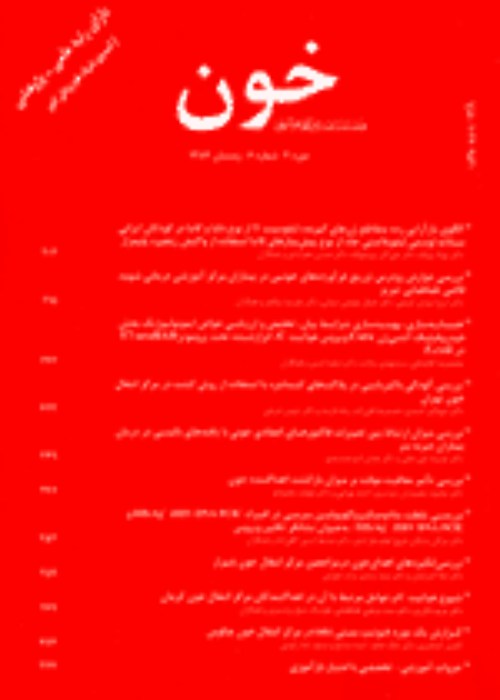Molecular blood genotyping in patients with Thalassemia major in Tehran Adult Thalassemic Clinic
Author(s):
Abstract:
Background and Objectives Blood typing by serologic methods after transfusion has limitations due to presence of donor red cells in recipients. Accurate determination of red blood cells (RBCs) antigens is very important in multitransfused patients including beta-thalassemics and sickle cell anemics. So, the aim of this study was to evaluate DNA- based methods as supplement to the hemagglutination technique to determine the red blood cell (RBC) antigen profile of multitransfused patients with beta- thalassemia. Materials and Methods DNA was extracted from peripheral blood of 20 apparently normal people and 44 patients including 35 with beta- thalassemia (out of whom 19 had clinical evidence of delayed hemolytic transfusion reaction), 8 with thalassemia intermedia (out of whom 2 had hemolytic reaction), and one with sickle cell thalassemia. RHD/ RHC/ RHc/ RHE/ RHe/ JKA/ JKB/ FYA/ FYB/ KELL1/ KELL2 alleles were determined by PCR and were then compared with the hemagglutination method. Results Phenotype and genotype results were the same in all controls. The phenotypes and genotypes of 53 blood antigens of 26 patients were incompatible. Most of the discrepancies (19 cases) occurred in the Rh system, and fifteen in the Duffy and Kidd systems.Conclusions The results show that screening platelet concentrates for bacterial contamination is necessary for blood transfusion centers and hospital blood banks. Blood typing by serologic method was not accurate in this study but genotyping could determine true blood groups in multitransfused patients and help in selection of RBCs without alloimmunized antigens in future transfusion attempts. Specificity, sensitivity, positive and negative predictive values of hemagglutination method for RhD antigen had good values in comparison to the molecular method. This might be due to pre- transfusion determination of RhD for thalassemic patients so as to receive Rh- matched blood units. It seems pre-transfusion blood typing of Rh and Kell antigens, which are the cause of hemolytic reactions, in comparison to the molecular method could be cost effective. In addition, typing of Rh and Kell antigens in some regular blood donors could be helpdul for selecting antigen-negative RBCs for transfusion dependent patients
Language:
Persian
Published:
Scientific Journal of Iranian Blood Transfusion Organization, Volume:6 Issue: 2, 2009
Page:
107
magiran.com/p652062
دانلود و مطالعه متن این مقاله با یکی از روشهای زیر امکان پذیر است:
اشتراک شخصی
با عضویت و پرداخت آنلاین حق اشتراک یکساله به مبلغ 1,390,000ريال میتوانید 70 عنوان مطلب دانلود کنید!
اشتراک سازمانی
به کتابخانه دانشگاه یا محل کار خود پیشنهاد کنید تا اشتراک سازمانی این پایگاه را برای دسترسی نامحدود همه کاربران به متن مطالب تهیه نمایند!
توجه!
- حق عضویت دریافتی صرف حمایت از نشریات عضو و نگهداری، تکمیل و توسعه مگیران میشود.
- پرداخت حق اشتراک و دانلود مقالات اجازه بازنشر آن در سایر رسانههای چاپی و دیجیتال را به کاربر نمیدهد.
In order to view content subscription is required
Personal subscription
Subscribe magiran.com for 70 € euros via PayPal and download 70 articles during a year.
Organization subscription
Please contact us to subscribe your university or library for unlimited access!


